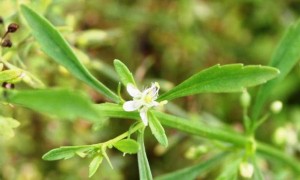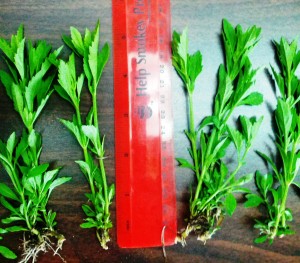During an April site inspection of perennial peanut fields with agents and a farmer, we noticed a weed that was not readily identifiable by any of us. Then, as so often happens, a few days later another farmer brought the same weed into the Extension office saying it was very difficult to control and seems to be spreading.

Goatweed flowers are white and located in the leaf axils. The plant becomes leggy and woody as it matures. Image by Brent Sellers
I took images of the sample and sent it to UF/IFAS weed management specialists for identification via the UF/IFAS Distance Diagnostic Identification System (DDIS). Dr. Jason Ferrell, UF/IFAS Weed Scientist quickly identified it as goatweed, saying “this plant is quite tolerant…. The only way we have found to control it is with high rates of 2,4-D or glyphosate.” In the UF/IFAS publication entitled “Goatweed Biology and Control in Pastures” author Dr. Brent Sellers writes “Goatweed (Scoparia dulcis), also referred to as sweet broom and licorice weed, is a perennial plant that is becoming a serious problem in pastures. A problematic weed in citrus groves for many years, goatweed now appears to be proliferating in improved pastures as the calls for its identification and control have increased greatly over the past couple of years. The spread of goatweed in Florida can be attributed to a number of things including prolific seed production, movement of seeds from citrus groves to pastures through mowing equipment or wildlife, and the tolerance of goatweed to several herbicides utilized in citrus groves and pastures. Goatweed is particularly dense in areas that have been overgrazed or previously harvested for sod.”
If this weed is a problem in your fields, please refer to the following publication for control advice Goatweed Biology and Control in Pastures.
If you have questions about other weeds, please bring a sample to your local County Extension Office. An Agent there will help to identify it and provide management recommendations.
- Maintaining Dissolved Oxygen Levels in Your Pond to Reduce Fish Kills - September 21, 2018
- The Bumble Bee – One of Florida’s Vital Pollinators - September 14, 2018
- 2017-2018 Bee Informed Partnership’s National Bee Colony Loss Report - July 13, 2018

